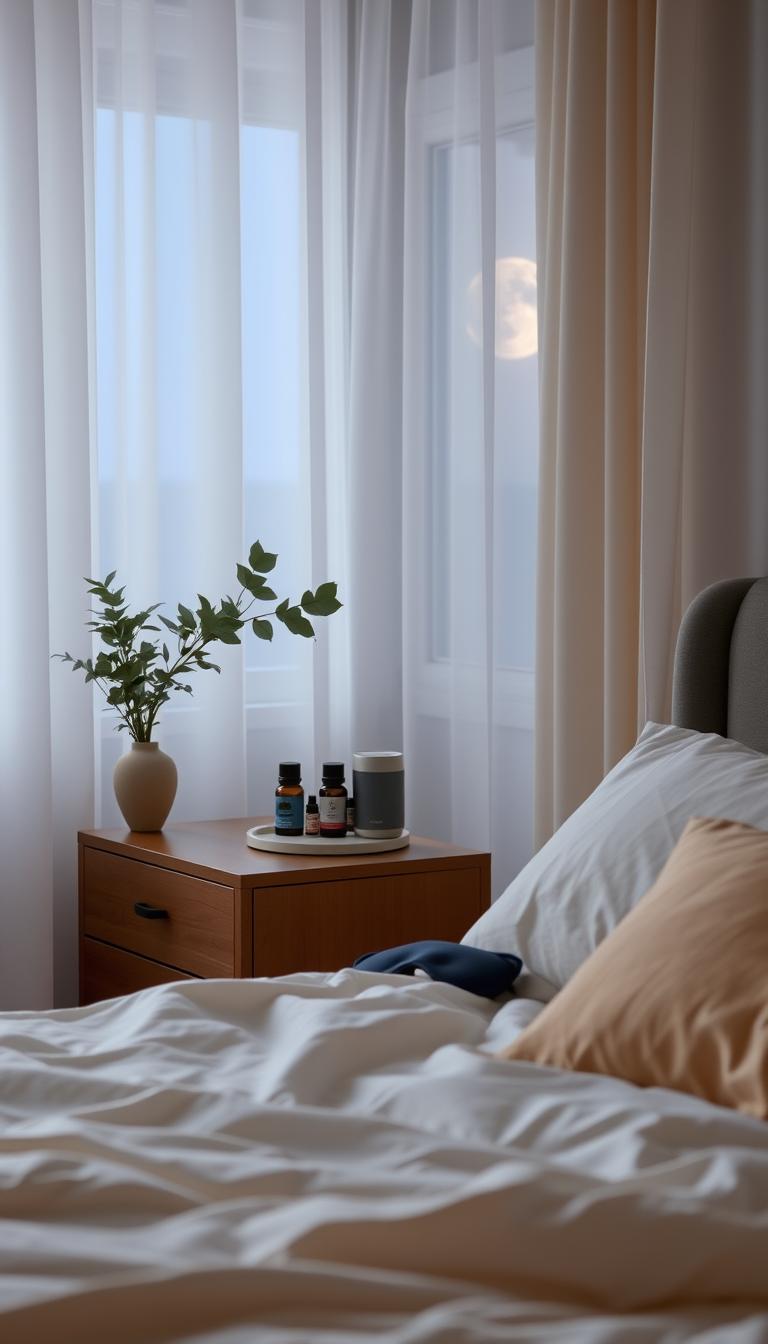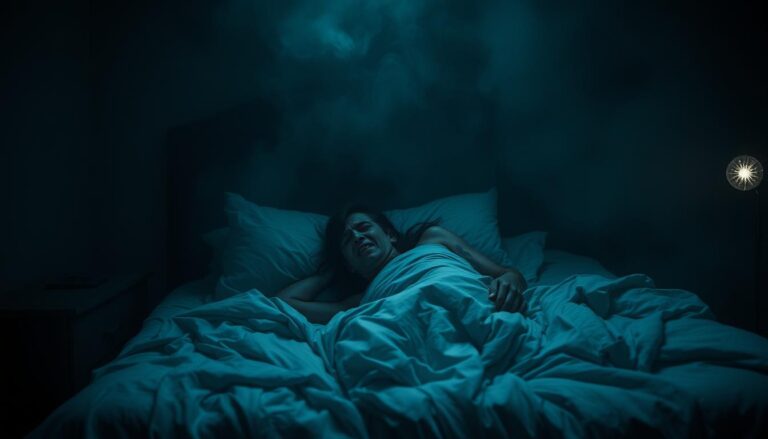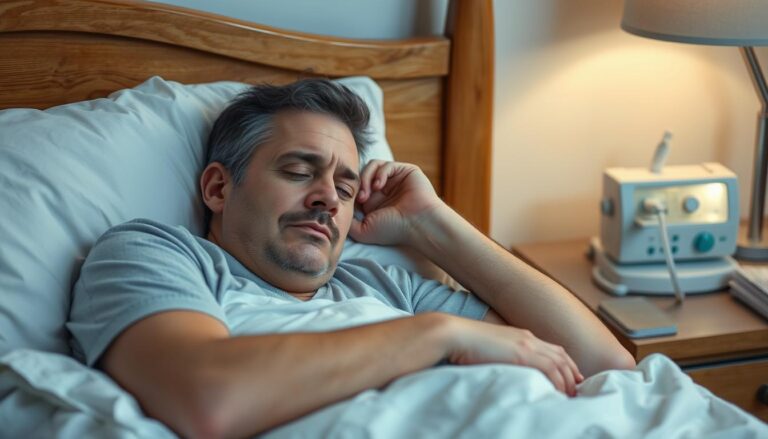
Did you know over 50 million Americans have tinnitus? And 69% of them have trouble sleeping because of it. There’s a strong link between tinnitus and sleep apnea. Research shows 30% of sleep apnea patients also have tinnitus.
Poor sleep from both conditions can make your health worse. Could tinnitus cause sleep apnea? Or does poor sleep from tinnitus make symptoms worse?
Recent studies found a two-way link. High-frequency snoring from sleep apnea might harm your hearing. Tinnitus’s ringing can keep you awake, creating a cycle of fatigue.
Both conditions can hurt your career, relationships, and heart health. If you’ve tried treatments like hearing aids or CPAP machines, you might see improvements in both issues. But how exactly do these conditions influence each other?
Key Takeaways
- Over 50 million Americans have tinnitus, with 69% facing poor sleep quality.
- 30% of people with sleep apnea also experience tinnitus, hinting at a shared cause.
- CPAP machines used for sleep apnea may reduce tinnitus symptoms by improving ear oxygen levels.
- Frequent loud noises like snoring can damage hearing, linking tinnitus and sleep apnea.
- Untreated tinnitus and sleep apnea raise risks for heart disease and strained daily life.
Understanding Tinnitus and Its Common Symptoms
Millions of Americans hear noises like ringing or buzzing without any sound around. For 1 in 5 adults, these sounds can really mess up their day. They often make it hard to sleep. Knowing about tinnitus’s effects is the first step to dealing with tinnitus and sleep disorders.
What Exactly Is Tinnitus?
Tinnitus isn’t a disease but a sign of something else. You might hear sounds like roaring or hissing. It can be just for you or sometimes a doctor can hear it too.
Over 50 million Americans live with it. It often comes from hearing loss, ear injuries, or blood flow problems.
Common Symptoms and Severity Levels
- Ringing, buzzing, or clicking in one or both ears
- Fluctuating volume or constant noise
- Worsening symptoms in quiet environments
How bad it is can vary a lot. For example, 40% of people with tinnitus say it’s mild. But 60% say it’s more serious.
Studies show a strong link between tinnitus and sleep apnea. People with tinnitus are more likely to have bad sleep. And 61% say they have insomnia symptoms.
The Psychological Impact of Persistent Ringing
“The noise never stops—it’s like a relentless background hum,” said a study participant describing their experience.
Living with tinnitus can make you anxious, stressed, or even depressed. These feelings can make sleep worse. This creates a cycle where poor sleep makes symptoms seem louder.
Getting help for tinnitus early can help break this cycle. It can improve your overall health and well-being.
Sleep Apnea Explained: More Than Just Snoring
Obstructive sleep apnea (OSA) blocks your airway, causing breathing to stop and start. It’s not just loud snoring. It’s a cycle where relaxed muscles cut off airflow, lowering oxygen and raising heart rate. Imagine waking dozens of times an hour without even knowing it.
Common signs include gasping for air, morning headaches, or feeling very tired. If left untreated, OSA can lead to heart disease, diabetes, and high blood pressure. Studies show 30% of people with OSA also have tinnitus and obstructive sleep apnea symptoms. Tinnitus can make both conditions worse: loud snoring can make ringing in the ears louder, and tinnitus’s noise can make it hard to sleep.
- Symptoms: Snoring, choking sensations, daytime fatigue, memory issues
- Risk factors: Obesity, smoking, thicker neck, family history
- Health risks: Stroke, irregular heartbeats, metabolic syndrome
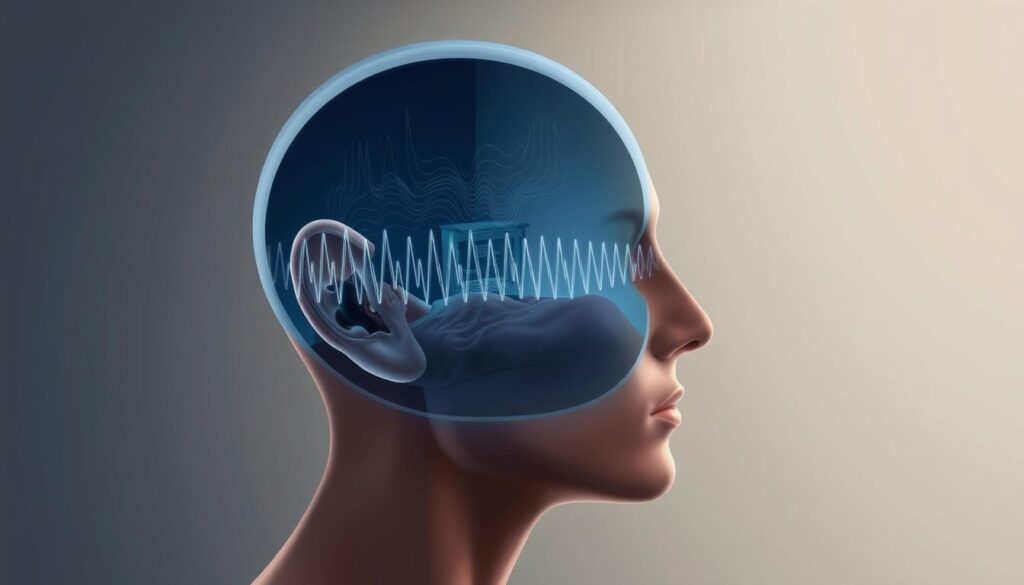
Research shows tinnitus sufferers often report louder snoring sounds in the 800–1,500 Hz range. This frequency is linked to inner ear damage. A 2016 study found tinnitus patients had 22% higher odds of severe OSA. Treatments like CPAP machines can improve breathing and may reduce tinnitus severity by lowering strain on auditory pathways.
Your sleep quality is very important. Even mild OSA raises risks for physical and mental health. Recognizing these overlaps helps address both tinnitus and obstructive sleep apnea through holistic care.
Can Tinnitus Cause Sleep Apnea? Exploring the Connection
Researchers are finding strong links between tinnitus and sleep apnea. They are still studying why this happens. But, studies show they often go hand in hand.
A recent study found 33% of people with sleep disorders also had tinnitus. And 22% with OSA symptoms had hearing problems. Let’s look at what science says.

Key Findings from Medical Research
Albany Medical College found sleep apnea patients were 30% more likely to have hearing loss. This is because low oxygen during apnea episodes can harm inner ear cells. A NHANES study of 9,693 adults showed:
- 29% of participants had sleep trouble linked to tinnitus
- Those with sleep disorders faced a 1.57x higher risk of bothersome tinnitus
- OSA symptoms increased tinnitus likelihood by 42%
Shared Risk Factors Explained
Age, obesity, and heart disease increase the risk for both conditions. Chronic stress from poor sleep can also make tinnitus worse. Studies show:
- 30% of OSA patients experience tinnitus
- 69% of tinnitus sufferers report poor sleep quality
How They Worsen Each Other
Sleep problems from tinnitus can make breathing harder, leading to apnea. On the other hand, apnea’s low oxygen can make tinnitus worse. A study found CPAP therapy helped 78% of users after 3 months.
The cycle is clear: poor sleep → worse symptoms → more health strain.
The Sleep-Disrupting Effects of Tinnitus
Do you struggle to sleep because of ringing in your ears? You’re not alone. Up to 77% of tinnitus patients face tinnitus and sleep disturbances as their biggest challenges. At night, the noise seems louder, making it hard to fall asleep. This isn’t just about feeling tired—it could mean a link between tinnitus effects on sleep apnea.
Poor sleep weakens the brain’s stress management. This can make breathing worse during sleep.
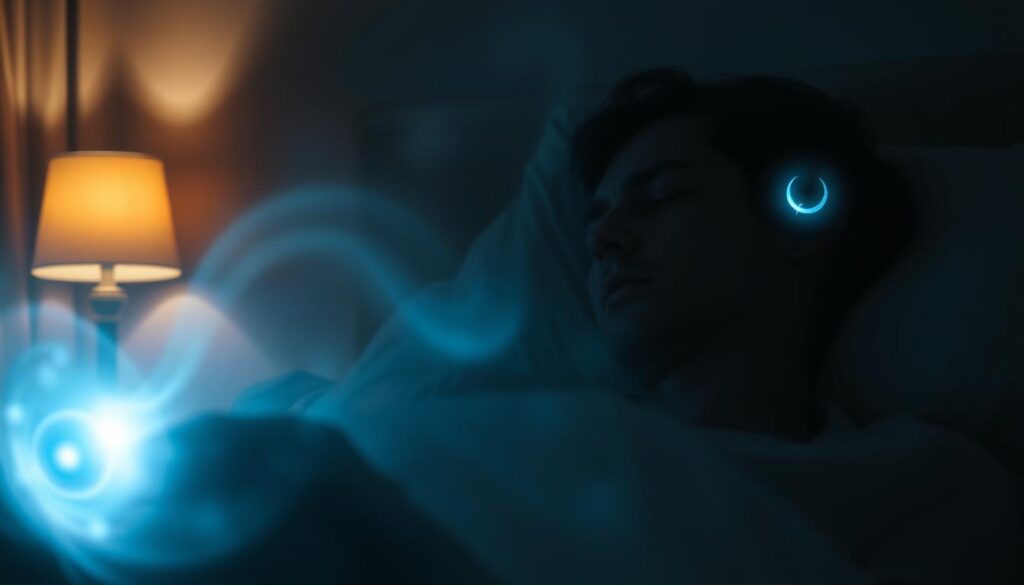
How Nighttime Tinnitus Affects Sleep Quality
Noise in your ears disrupts sleep in three ways:
- Increased awareness: Tinnitus sounds seem louder in quiet places, making it hard to fall asleep.
- Fragmented rest: 54% of people wake up many times at night, studies show.
- Reduced deep sleep: Bad sleep quality lowers oxygen and messes with brain detox, making symptoms worse.
The Vicious Cycle of Poor Sleep and Worsening Symptoms
Here’s how the cycle works:
| Stage | Sleep Impact | Tinnitus Impact |
|---|---|---|
| 1. Tinnitus starts | Difficulty falling asleep | No change yet |
| 2. Sleep deprivation | Reduced deep sleep stages | Perceived loudness increases by 30-40% |
| 3. Stress hormones rise | More frequent awakenings | Brain pathways become hyperactive |
To break this cycle, we need to tackle both problems. Cognitive Behavioral Therapy for Insomnia (CBT-I) helps 70-80% of tinnitus patients sleep better. Devices like CPAP machines for sleep apnea can also help. It’s key to focus on sleep hygiene and seek help early to stop this cycle.
Common Causes That Link Tinnitus and Sleep Disorders
Understanding the relationship between tinnitus and sleep apnea starts with shared health risks. Conditions like high blood pressure and diabetes don’t just impact your heart—they also strain your ears and breathing. Let’s break down the key factors connecting these challenges:
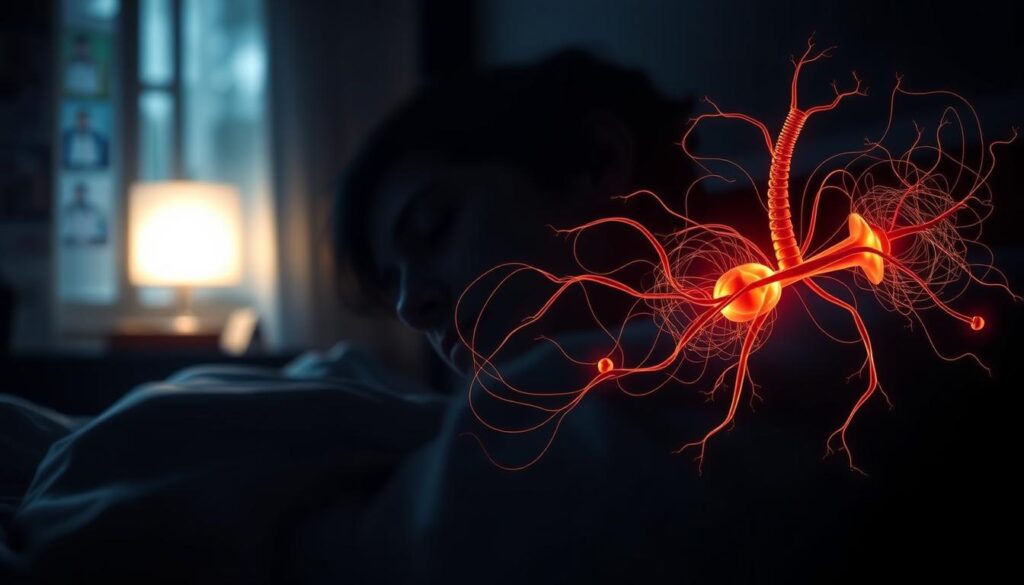
- Heart Health: High blood pressure strains blood vessels, reducing oxygen flow to inner ear tissues and narrowing airways during sleep.
- Metabolic Issues: Obesity and diabetes slow healing in ear cells while thickening throat tissues, worsening sleep apnea.
- Stress Hormones: Chronic stress from poor sleep boosts inflammation, which can amplify ringing in the ears.
- Medications: Some blood pressure drugs or pain relievers might worsen both conditions when used long-term.
| Risk Factor | Impact on Tinnitus | Impact on Sleep Apnea |
|---|---|---|
| Hypertension | Restricted ear blood flow | Increased throat muscle collapse risk |
| Obesity | Ear tissue inflammation | Excess neck fat blocking airways |
| Smoking | Ear lining damage | Throat irritation and swelling |
When oxygen drops during sleep apnea episodes, ear cells may suffer silent damage. Loud snoring from apnea can also trigger or worsen ringing sounds. Addressing these shared causes—like managing weight or blood sugar—can improve both conditions. Your doctor might recommend sleep studies or hearing tests to pinpoint overlapping issues.
Diagnosing Both Conditions: What to Tell Your Doctor
Telling your doctor about tinnitus and sleep disorders is key. Share all symptoms, no matter how small. This helps doctors link tinnitus and obstructive sleep apnea or other health problems.
If you suspect sleep apnea, try our free sleep quiz to identify potential symptoms and guide your discussion with a healthcare provider.
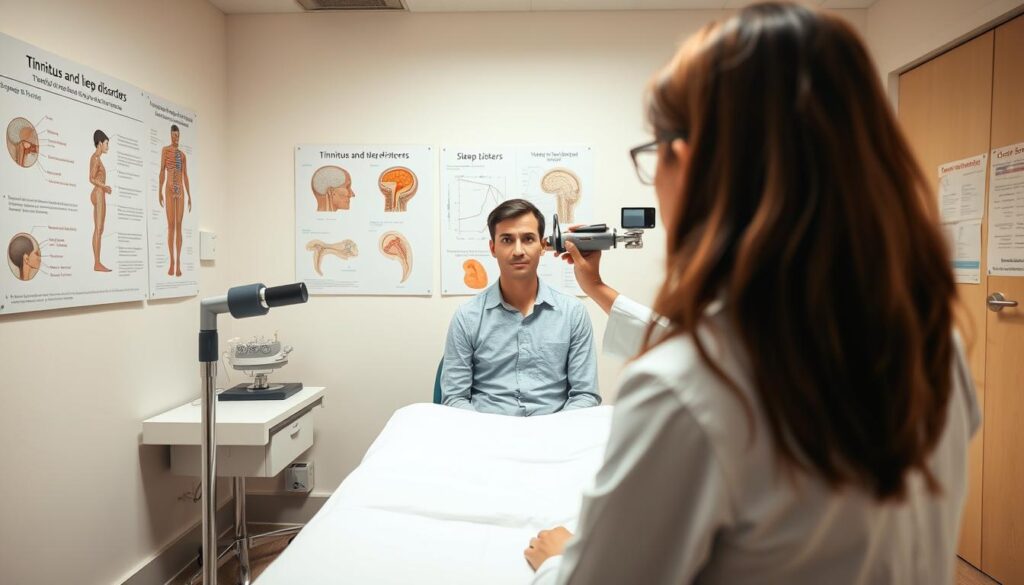
Key Symptoms to Report
- Tinnitus details: Note when ringing occurs (e.g., at night), during silence), or after loud noises), and describe sound type (ringing, buzzing, roaring).
- Sleep issues: Mention snoring, gasping for air, daytime fatigue, or morning headaches. Track patterns like insomnia or frequent awakenings.
Tests and Evaluations You Might Undergo
Doctors may recommend:
- Audiological exams to assess hearing loss linked to tinnitus.
- Sleep studies (in-lab or at-home) to measure breathing patterns and apnea-hypopnea index (AHI) scores.
About 30% of people with OSA also report tinnitus symptoms, so linking these during testing is crucial.
Finding the Right Specialist
Start with your primary care provider, then consult an ENT for ear health, an audiologist for hearing tests, or a sleep specialist for apnea evaluation. Mention both conditions to all specialists to ensure a holistic approach. For veterans, note that connecting tinnitus and sleep apnea can impact disability ratings and treatment options.
Treatment Options That Address Both Tinnitus and Sleep Apnea
Managing the connection between tinnitus and sleep apnea starts with treatments for both. A CPAP machine is key for sleep apnea. It boosts oxygen in your blood. This can help reduce tinnitus symptoms like ringing sounds.
Studies show CPAP lowers glucose levels in diabetics and reduces blood pressure spikes. This eases strain on ears and brain.
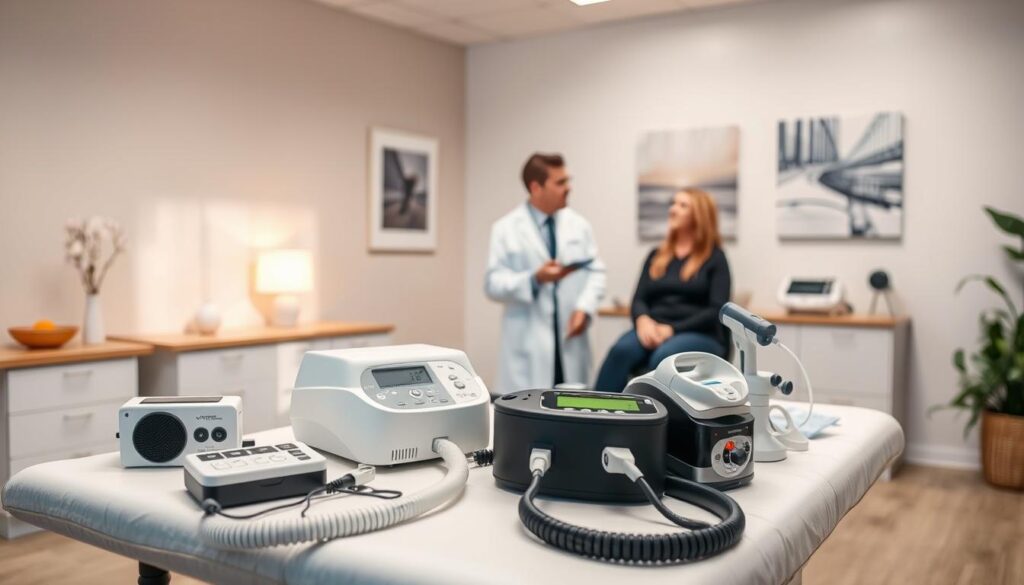
- CPAP therapy: Keeps airways open, boosting oxygen and easing tinnitus linked to sleep disruptions.
- Oral appliances: Mandibular advancement devices reposition the jaw to open airways, reducing nighttime symptoms.
- Positional therapy: Sleeping on your side may cut apnea episodes and lower tinnitus triggers.
For tinnitus-focused care, consider:
- Sound therapy: White noise machines or hearing aids with masking features can drown out ringing.
- Retraining therapy: Combines counseling and sound generators to retrain your brain’s response to tinnitus.
Medications for high blood pressure or diabetes are important too. Managing these conditions can help ease symptoms. Work with ENT specialists and sleep doctors to coordinate care. Clinical trials also explore new therapies, so ask about emerging options.
Lifestyle Changes to Improve Both Conditions
Making small changes in your daily life can greatly help with tinnitus and sleep disturbances. By tackling both issues at once, you can lessen symptoms and feel better overall. Here’s where to begin.

“A balanced diet and mindful habits can break the cycle of tinnitus effects on sleep apnea and improve your quality of life.” — International Tinnitus Journal
Dietary Adjustments That May Help
Eating well can help calm inflammation and keep blood sugar stable. A study in the International Tinnitus Journal showed:
| Strategy | Impact |
|---|---|
| Diabetes-friendly diet | 5x higher symptom reduction |
| Low caffeine/alcohol intake | Less nighttime tinnitus flare-ups |
After two years, 15% of people got rid of tinnitus by eating right. Adding foods that fight inflammation, like leafy greens and fish rich in omega-3, is a good start.
Sound Therapy and Sleep Environment Modifications
- Use white noise machines to mask tinnitus sounds
- Keep rooms cool (60-67°F) for better sleep
- Elevate the head with pillows to ease breathing
70% of patients found relief with sound therapy. Sound machines help by making a soothing background noise.
Stress Management Techniques That Work
Mindfulness and exercise can lower stress hormones that affect both conditions. Try:
- 10-minute deep breathing exercises before bed
- Walking or yoga for 30 minutes daily
- Cognitive behavioral therapy (CBT) for 60% better sleep outcomes
Stress-reducing activities can improve sleep by 40%. This helps break the cycle of tinnitus and sleep disturbances.
When to Seek Immediate Medical Attention
Severe symptoms from tinnitus and obstructive sleep apnea or tinnitus and sleep disorders need quick action. Here’s how to spot emergencies:
- If you suddenly lose hearing, feel dizzy, or have facial weakness, get help fast. These signs might mean Meniere’s disease or acoustic neuroma.
- Severe chest pain, gasping for air at night, or morning headaches that mess up your day are emergencies. Sleep apnea can lower oxygen levels, harming your heart and brain.
- Daytime sleepiness so bad it could cause accidents or chest pain at night might mean serious heart problems or stroke risks.
| Emergency Symptoms | Non-Emergency Symptoms |
|---|---|
| Chest pain, sudden hearing loss, facial weakness | Ringing in ears, occasional snoring, mild fatigue |
| Gasping for air during sleep | Difficulty falling asleep due to tinnitus |
| Waking with choking sensations | Mild daytime tiredness |
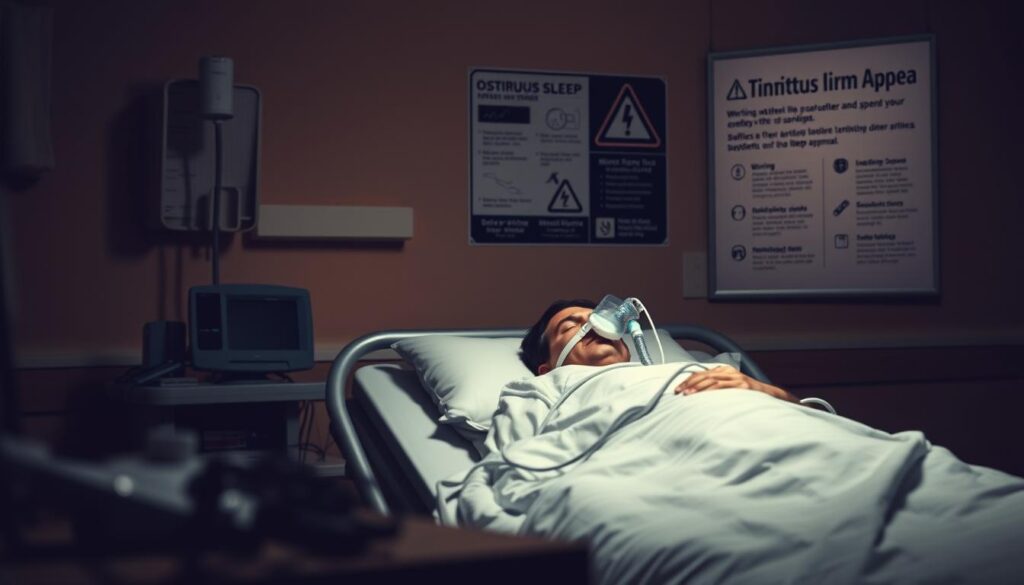
If you have extreme oxygen lack (from sleep apnea) or sudden brain changes, call 911. For ongoing ringing without sudden changes, see an ENT or sleep doctor quickly. Always put safety first—don’t hesitate if your body is screaming for help.
Conclusion: Taking Control of Your Tinnitus and Sleep Health
Your health is important. Knowing how tinnitus and sleep apnea are linked is a big step. Studies show 29% of people with tinnitus have trouble sleeping. And 69% say their sleep quality is poor.
Even if tinnitus might not directly cause sleep apnea, their effects on each other are clear. The focus should be on managing both to improve your health.
A diagnosis is crucial. Over 57% of those with tinnitus sleep less than eight hours a night. This makes symptoms worse. If you’re in this group, tracking your symptoms and seeing a specialist can help.
They might suggest CPAP therapy to improve oxygen levels during sleep. Lifestyle changes, like using noise-canceling devices, also help.
Remember, 2.3 million U.S. veterans get care for tinnitus. But you’re not alone. With the right steps, like addressing insomnia or using sound therapy, you can break the cycle.
Prioritize sleep assessments and therapies that reduce both conditions. Small changes today, like tracking sleep or adjusting your environment, can make a big difference. You deserve restful nights and quieter days.







